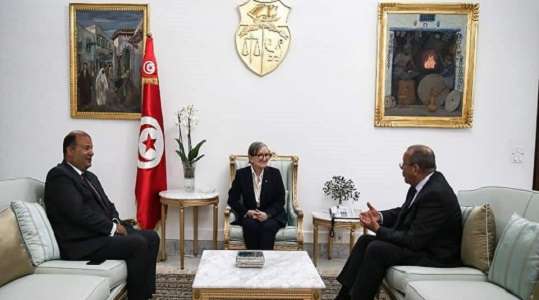The Tunisian Prime Minister, Najla Bouden Romdhane, received at the Government Palace in the Kasbah the Secretary-General of the Union of Arab Chambers, Dr. Khaled Hanafi, in the presence of the President of the Tunisian Union of Industry, Trade and Handicrafts Samir Majoul.
The Secretary-General of the Union of Arab Chambers confirmed that the meeting with the Head of Government was fruitful and touched upon several economic issues at the Arab level, announcing the return of the Tunisian Union of Industry, Trade and Handicrafts to the circle of joint Arab action within the Union of Arab Chambers, and appreciating its role in supporting the private sector, in this context, he called on Arab businessmen and investors to come and invest in Tunisia.
He highlighted that the Union of Arab Chambers is studying the possibility of organizing a conference for Arab businessmen and investors in Tunisia, pointing to a review of the prospects for supporting joint Arab cooperation, especially in the areas of linking ports between Tunisia and a number of Arab countries. Which contributes to advancing maritime trade between them and to be platforms for launching towards new and promising markets through strategic alliances that achieve value-added for Arab economies. The meeting also touched on the importance of supporting the entrepreneurship sector, especially in the fields of modern technology, and the importance of developing it and establishing new poles in the internal regions in Tunisia that would be able to advance its development.
He explained that the union, which includes 22 Arab countries and 16 countries from different continents, seeks today to benefit from Tunisian experiences and trends in several economic and investment fields.
The Secretary-General participated in the work of the 53rd session of the Higher Coordination Committee for Joint Arab Action, which was held at the headquarters of the Arab States Broadcasting Union in Tunis, where the Secretary-General of the League of Arab States, Ahmed Aboul Gheit, supervised the work of the session remotely. Ambassador Hossam Zaki chaired the work of the committee on behalf of the Secretary-General, where he delivered a speech in his name in which he praised the progress made on the subject of digital transformation. Which was addressed by the committee in the previous three sessions, which resulted in the achievement of several important achievements in areas related to digital technology, such as the launch of the Arab strategy for cybersecurity, and the establishment of the Arab Forum for the Digital Economy and the formation of working teams in charge of the topics of artificial intelligence, the smart university, and the preservation of Arab networks against electronic piracy.
The work of the current session of the forum focused on “the repercussions of the Russian-Ukrainian war on the economic situation in the Arab region.” As that war worsened the situation and resulted in a global food crisis with high energy prices and a direct impact on food products, and it required reviving the Arab debate on the issue of Arab food security.
Ambassador Zaki explained that the food gap in the Arab world, which currently exceeds 100 million tons of commodities, will worsen if governments and organizations do not intervene to solve it. Especially since there are many influencing factors, including demographics, such as doubling the population of the Arab world, climatic factors such as drought and water scarcity, and weak Arab investment in agricultural projects.
The session’s work witnessed extensive discussions on the issue of Arab food security, as a detailed briefing was presented in this regard, which dealt with the current situation of agricultural production and the obstacles to its development, previous efforts and initiatives put forward within the framework of Arab cooperation to reduce the food gap were also reviewed. In the same context, many ideas and suggestions were put forward that dealt with financing issues, raising investment in the agricultural sector, forming an Arab strategic food stock, exploiting the advantages and wealth that the Arab region has, and other ideas.
The meeting of the Higher Coordination Committee for Arab Action, held, provides an opportunity to consider unifying the efforts of all Arab organizations and their vision to deal with the issue of Arab food security, especially in light of the current crises that have further exacerbated the situation globally and in the Arab world. It should be noted in this regard that the session's work witnessed the signing of five cooperation agreements between joint Arab action institutions and partner agencies.
Source (Union of Arab Chambers)

